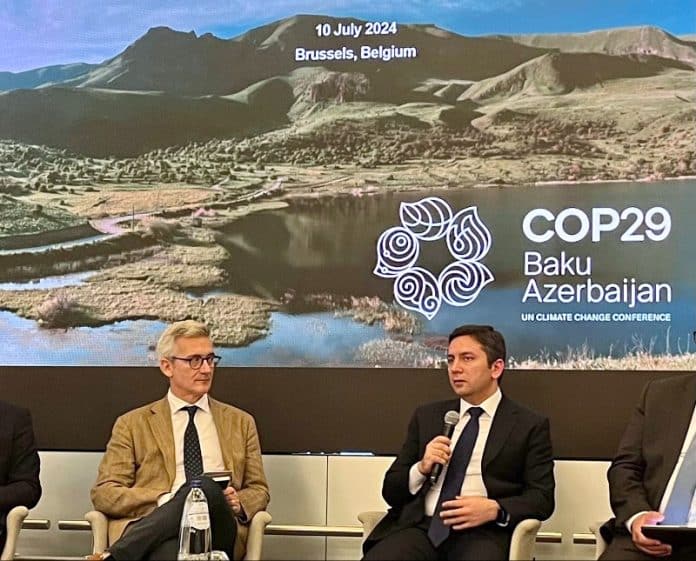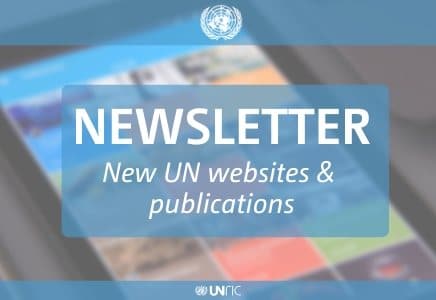Set to take place in Baku, Azerbaijan, from 11 to 22 November 2024, the 29th United Nations Climate Change Conference (COP29) aims to be a “Truce COP”, with a call for a one-month global cease-fire during the conference.
“This initiative is inspired by the Olympic Games truce“, said Yalchin Rafiyev, Deputy Foreign Minister of the Republic of Azerbaijan and Chief Negotiator for COP29, during an event in Brussels, organised on 10 July 2024 by the Embassy of Azerbaijan in Brussels in collaboration with the United Nations Development Programme (UNDP).
The call for a truce is “not only to promote peace but also because military activities around the globe are the source of 5% to 6% of global emissions”.
Titled “COP29: Empowering Climate Action through Ambition, Implementation, and Inclusivity”, the meeting organised in Brussels allowed Azerbaijan to present its ambitions as the host country of the next COP.
Updated national plans
To “enhance ambition and enable action”, workshops are being organised to support countries in submitting their plans as soon as possible before the COP.
The deadline for the Nationally Determined Contributions (NDC) is set for February 2025, and the Biannual Transparency Reports (BTR) by 31 December 2024, but countries are encouraged to submit their plans, including their National Adaptation Plans (NAP) before the next COP, to “generate a momentum to follow”.
A New Collective Quantified Goal
In 2009, developed countries agreed to collectively mobilise $100 billion annually by 2020 for climate action in developing countries. A successor climate finance goal is set to be formalised at COP29 in Baku. The New Collective Quantified Goal (NCQG) is to be set from a floor of $100 billion, taking into account the needs and priorities of developing countries.
The new goal could mitigate some of the issues that underpinned the $100 billion target that developed countries failed to meet in 2020 and 2021.
“This major step, expected in Baku, is among our top negotiation priorities”, said Yalchin Rafiyev. Divergent views among parties remain, but “this is the moment of truth for the international climate community and the Paris Agreement. If we adopt this decision, the parties, particularly the developing countries, will have raised confidence towards the international climate architecture”. Several discussions around this issue will take place in the coming months.
Article 6 of the Paris Agreement on carbon markets
“This is the second major expected deliverable of COP29”, stressed the Deputy Foreign Affairs Minister of Azerbaijan. “Current turnover in the carbon markets is about 2.2 to 2.5 billion dollars. If operationalised, as desired, this figure can be increased multiple times, providing additional contributions to global climate finance”.
“Tangible progress has been made during the Bonn session”, he added. From 3-13 June at the Bonn climate conference, national delegations reconvened formal negotiations on carbon markets and Article 6 of the Paris Agreement for the first time since the failed talks at COP28.
14 Presidential Initiatives for COP29
Besides a call for a global truce, the Presidency of COP29 intends to launch 13 other initiatives. Among them are green energy corridors and zones, clean hydrogen, green energy storage, and accelerating climate action in tourism.
A Climate Investment Fund for Future will be launched, seeking to increase the private sector’s involvement in financing climate action and transition in the developing world.
The next COP should be “an enabling COP”, said Jacob Werksman, Principal Advisor at the Directorate General for Climate Action of the European Commission. “It is very much about delivering our finance, (…) and we must undertake a transition away from fossil fuels,” he stressed.
“The 1,5° target is still possible, but not for long”, said Georges van Montfort, Deputy Director of UNDP’s Representation Office in Brussels. “We need to seize the opportunity and act now”.


